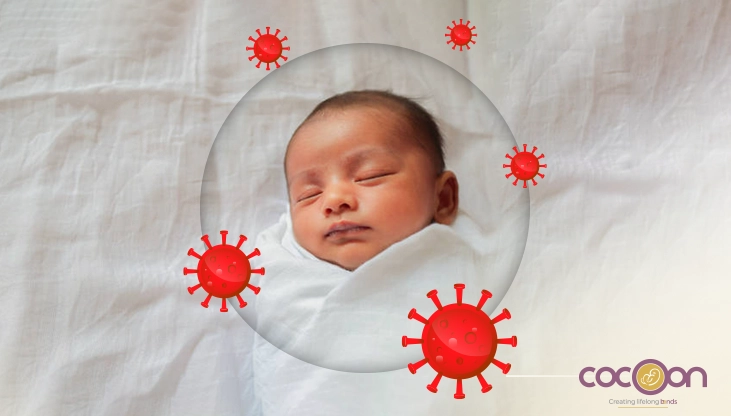Congratulations! You’ve welcomed a healthy little one into your world. Finally, all those months of patiently eating a healthy diet for your baby’s growth have truly paid off. But WAIT, as a parent, your real journey begins now: keeping your baby healthy and safe lifelong.
With today’s polluted environment and climate, infants are more vulnerable to infections than ever before. That’s why it’s important to prepare their tiny bodies in advance to fight off unwelcome germs. After all, you’d rather spend time giggling and playing with your baby than comforting them through fevers.
In this blog, we’ll walk you through the complete vaccination guide for the first year and why each step matters. Let’s start with:
What is the Complete Infant Vaccination Schedule from Birth to 12 Months
The Complete Infant Vaccination Schedule from Birth to 12 Months is an essential healthcare plan. It is designed in a way that helps protect your infant from serious to potentially life-threatening diseases.
This infant vaccination schedule works by building their immune defense to keep infections at bay early in life.
It is a timeline that includes detailed information about:
- Recommended vaccines (vaccines against diseases such as hepatitis B, diphtheria, tetanus, pertussis (whooping cough)
- Vaccines doses
- The appropriate ages for administration during the first year of life.
Guide for Infant Vaccination Schedule: Birth to 1 Year
Read the following to know the vaccination schedule for infants in India. You will get to know the birth dose vaccines for newborns, why each vaccine is crucial, and what it protects your little one from:
At Birth (Within 24 Hours)
- BCG (Bacillus Calmette-Guérin): Protect against tuberculosis affecting lungs and other body organs.
- Hepatitis B (Birth Dose): Protect against the virus i.e, hepatitis B that causes liver infection and long-term liver damage.
- OPV-0 (Oral Polio Vaccine, zero dose): Protect against the virus i.e polio, known to cause paralysis.
At 6 Weeks
- DTaP/DTwP (Diphtheria, Tetanus, Pertussis) 1st Dose: Protect against throat infection, muscle stiffness, severe coughing.
- Hib (Haemophilus influenzae type b) 1st Dose: IPV (Inactivated Polio Vaccine) 1st Dose: Protect against lung, brain, and spinal cord infection.
- Hepatitis B 2nd Dose: Protect against liver infection.
- PCV (Pneumococcal Conjugate Vaccine) 1st Dose: Protects against lung, brain, blood, and spinal cord infectio n
- Rotavirus Vaccine 1st Dose: Protect against severe diarrhea and dehydration due to rotavirus infection.
At 10 Weeks
- DTaP/DTwP 2nd Dose
- Hib 2nd Dose
- IPV 2nd Dose
- Hepatitis B 3rd Dose
- PCV 2nd Dose
- Rotavirus Vaccine 2nd Dose
At 14 Weeks
- DTaP/DTwP 3rd Dose
- Hib 3rd Dose
- IPV 3rd Dose
- Hepatitis B 4th Dose (Note: if part of the
- schedule)
- PCV 3rd Dose
- Rotavirus Vaccine 3rd Dose
Note: The vaccination schedule mentioned above is for general information only. Always administer vaccines only under a paediatrician and under medical care. Your doctor will guide you on the right timing and doses for your newborn’s health
So, Why Follow This Complete Infant Vaccination Schedule
By now, you must have got the answer. But let us break it down for you. Your child needs this complete infant vaccination schedule for 4 reasons:
- Immature immune systems make them at risk of infections from viruses and bacteria.
- Vaccines give strength to their immune system to fight off infections.
- Following the schedule prevents future complications from vaccine-preventable diseases.
- Timely vaccines are pocket-friendly by preventing disease early, which would require expensive treatment later.
Conclusion
We know you’ll shower your baby with love. However, sometimes love alone isn’t enough; as a parent, you also need a thoughtful plan to give them the right start. This way, your baby can shine in games, dance, and sports without constantly falling sick.
As the saying goes, “prevention is better than cure”. That’s why it’s important to strengthen a child’s immune system in advance with the complete infant vaccination schedule.
Give your little one this essential start so they can stay healthy, blooming, and cheerful throughout life. And silently thank you with every happy giggle.
FAQs
Q1 How does a newborn baby vaccination chart look?
Ans: The recommended vaccine schedule for babies starts with Hepatitis B, BCG, and Oral Polio Vaccine. These are followed by doses of DTaP, Hib, IPV, PCV, and Rotavirus at 6, 10, and 14 weeks.
Q2 How many vaccines are there for a newborn?
Ans: A newborn receives 3 vaccines (Hepatitis B, BCG, and Oral Polio Vaccine) at the time of birth. These protect them against serious conditions, including lung and liver infection and paralysis.
Q3 Can we delay vaccination for babies?
Ans: Delay in the vaccination for babies is not recommended due to the high risk of infection and serious disease.
Q4 Why do parents say no to vaccines?
Ans: Parents say no to vaccines due to their concern about possible side effects, vaccine safety, or religious beliefs.

















